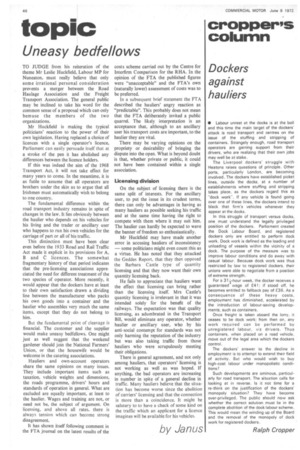topic
Page 48

If you've noticed an error in this article please click here to report it so we can fix it.
Uneasy bedfellows
TO JUDGE from his reiteration of the theme Mr Leslie Huckfield, Labour MP for Nuneaton, must really believe that only some irrational personal consideration prevents a merger between the Road Haulage Association and the Freight Transport Association. The general public may be inclined to take his word for the common sense of a proposal which can only bemuse the members of the two organizations.
Mr Huckfield is making the typical politicians' reaction to the power of their own legislation. Having replaced a choice of licences with a single operator's licence, Parliament can easily persuade itself that at a stroke of the pen it has abolished any differences between the licence holders.
If this was indeed the aim of the 1968 Transport Act, it will not take effect for many years to come. In the meantime, it is as futile to assume that all operators are brothers under the skin as to argue that all Irishmen must automatically wish to belong to one country.
The fundamental difference within the road transport industry remains in spite of changes in the law. It lies obviously between the haulier who depends on his vehicles for his living and the trader or ancillary user who happens to run his own vehicles for the carriage of part or all of his traffic.
This distinction must have been clear even before the 1933 Road and Rail Traffic Act made it explicit in its provisions for A, B and C licences. The somewhat fragmentary history of that period indicates that the pre-licensing associations appreciated the need for different treatment of the two species of operator. More recently, it would appear that the dockers have at least to their own satisfaction drawn a dividing line between the manufacturer who packs his own goods into a container and the haulier who assembles very much the same items, except that they do not belong to him.
But the fundamental point of cleavage is financial. The customer and the supplier would make uneasy bedfellows. One might just as well suggest that the weekend gardener should join the National Farmers' Union, or that the housewife would be welcome in the catering associations.
Hauliers and own-account operators share the same opinions on many issues. They include important items such as taxation, vehicle weights and dimensions, the roads programme, drivers' hours and standards of operation in general. What are excluded are equally important, at least to the haulier. Wages and training are not, or need not be, the subject of argument. On licensing, and above all rates, there is always tension which can become strong disagreement.
It has shown itself following comment in the FTA journal on the latest results of the costs scheme carried out by the Centre for Interfirm Comparison for the RHA. In the opinion of the FTA the published figures were "unacceptable" and the PTA's own (naturally lower) assessment of costs was to be preferred.
In a subsequent brief statement the FTA described the hauliers' angry reaction as "predictable". This probably does not mean that the FTA deliberately invited a public quarrel. The likely interpretation is an acceptance that, although to an ancillary user his transport costs are important, to the haulier they are vital.
There may be varying opinions on the propriety or desirability of bringing the dispute into the open. What is beyond doubt is that, whether private or public, it could not have been contained within a single association.
Licensing division On the subject of licensing there is the same split of interests. For the ancillary user, to put the issue in its crudest terms, there can only be advantages in having as many hauliers as possible seeking his traffic and at the same time having the right to compete with them where it may suit him. The haulier can hardly be expected to wave the banner of freedom so enthusiastically.
Mr Huckfield may have made another error in accusing hauliers of inconsistency — some politicians might even count this as a virtue. He has noted that they attacked the Geddes Report, that they then opposed the Barbara Castle type of quantity licensing and that they now want their own quantity licensing back.
He fails to appreciate that hauliers want the effect that licensing can bring rather than the licensing itself. Mrs Castle's quantity licensing is irrelevant in that it was intended solely for the benefit of the railways. The expectation was that quality licensing, as adumbrated in the Transport Bill, would eliminate any operator, whether haulier or ancillary user, who by his anti-social contempt for standards was not only harming the reputation of the industry but was also taking traffic from those hauliers who were scrupulously meeting their obligations.
There is general agreement, and not only among hauliers, that operators' licensing is not working as well as was hoped. If anything, the bad operators are increasing in number in spite of a general decline in traffic. Many hauliers believe that the situation has become worse since the abolition of carriers' licensing and that the connection is more than a coincidence. It might be salutary to to have a check of some kind on the traffic which an applicant for a licence imagines will be available for his vehicles.
by Janus




































































































